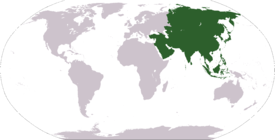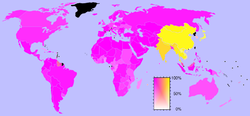- Eastern world
-
Part of a series on Eastern culture Cinema
Cuisine
Medicine
Philosophy
Religion
Eastern worldFor this article's equivalent regarding the West, see Western world or Western culture.The term Eastern world refers very broadly to the various cultures or social structures and philosophical systems of Eastern Asia or geographically the Eastern Culture. This includes the Indian subcontinent (comprising Bangladesh, Bhutan, India, Pakistan, Sri Lanka, the Maldives, Nepal and occasionally Afghanistan), the Far East (comprising China, Taiwan, Vietnam, Cambodia, Malaysia, Mongolia, Indonesia, Japan, North Korea, South Korea). The Middle East/Near East, and Central Asia sometimes are considered being a part of East Asia.
Contents
Introduction
 An image of the "Eastern world" defined as Asia.
An image of the "Eastern world" defined as Asia.
The division between "East" and "West" is a product of European cultural history, and of the distinction between European Christendom and the alien cultures beyond it to the East. With the European colonization of the Americas the East/West distinction became global. The concept of an Eastern, "Indian" (Indies) or "Oriental" sphere was emphasized by ideas of racial as well as religious and cultural differences. Such distinctions were articulated by Westerners in the scholarly tradition known as Orientalism and Indology. People from the East are known by certain regions in the West as "Oriental". During the Cold War, the term "Eastern world" was sometimes used as an extension of Eastern bloc, connoting the Soviet Union, China and their communist allies, while the term "Western world" often connoted the United States and its NATO allies such as the United Kingdom. The concept is often another term for the Far East—a region that bears considerable cultural and religious commonality. Eastern philosophy, art, literature, and other traditions, are often found throughout the region in places of high importance, such as popular culture, architecture and traditional literature. The spread of Buddhism and Hindu Yoga is partly responsible for this.
Eastern culture
An image of the "Eastern world" defined as the "Far East", consisting of three overlapping cultural blocks: East Asia, Southeast Asia, and South Asia. Main article: Culture of Asia
Main article: Culture of AsiaEastern culture has developed many themes and traditions. Some important ones are:
- Eastern religion, Eastern philosophy
- Far Eastern religions
- Confucianism — the belief that human beings are teachable, improvable and perfectible through personal and communal endeavour especially including self-cultivation and self-creation.
- Far Eastern Buddhism
- Shinto
- Daoism
- Indian religions
- Buddhism — path of liberation attained through insight into the ultimate nature of reality
- Hinduism - an umbrella term for religious sects native to India
- Jainism
- Sikhism — A religion that developed in the warring plains of Punjab in an atmosphere of ideological clash between Islam and Hinduism. Its followers retain spiritual as well as martial qualities.
- The Middle East, today largely coterminous with the Islamic world
- Christianity — like other Abrahamic religions like Judaism and Islam, originates in the Middle East, where it is now a small minority religion.
- Islam—the majority of the world Muslim population have always lived in Asia, due to Islam spreading and becoming the dominant religion of these areas.
- Judaism — although not as much of a presence as it once was, Judaism still exists in Asia (see Mizrahi Jews).
- Zoroastrianism, the monotheistic state religion of Sassanid Persia
- Far Eastern religions
- Oriental medicine
- Ayurveda
- Chinese medicine
- Traditional Tibetan medicine
- Traditional Korean Medicine
References
- Ankerl, Guy (2000) [2000]. Global communication without universal civilization. INU societal research. Vol.1: Coexisting contemporary civilizations : Arabo-Muslim, Bharati, Chinese, and Western. Geneva: INU Press. ISBN 2-88155-004-5.
Categories:- Country classifications
- Cultural concepts
- Eastern religion, Eastern philosophy
Wikimedia Foundation. 2010.


